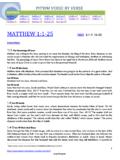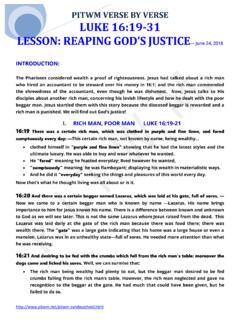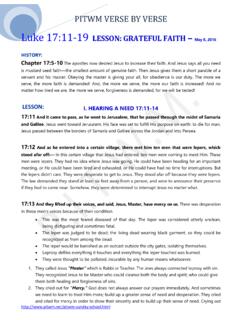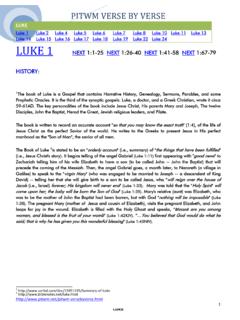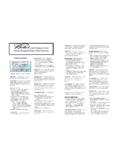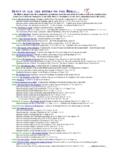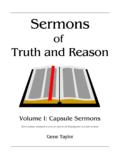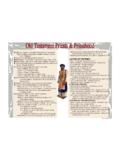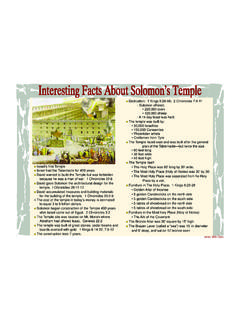Transcription of PITWM VERSE BY VERSE MATTHEW 12:1-14 …
1 PITWM VERSE BY VERSE MATTHEW 12:1-14 LESSON: JUSTICE AND SABBATH LAWS June 3, 2018 INTRODUCTION: The Pharisees had established 39 general categories of actions forbidden on the Sabbath. These were based on interpretations of God s law and on Jewish custom. Harvesting was one of those forbidden actions. By picking wheat and rubbing it in their hands, the disciples were technically harvesting, according to the religious leaders. I. SALVATION COMPLETE COMPLAINT MATTHEW 12:1-8 12:1 At that time Jesus went on the sabbath day through the corn; and his disciples were an hungred, and began to pluck the ears of corn and to eat. In this chapter Jesus deals with the rising opposition both from the religionists and from his own family.
2 He confronted attack after attack vindicating His Messiahship. Now, at this time Jesus and his disciples on the Sabbath Day went through the corn fields because they were hungry. Therefore, a hungry traveler was permitted by law to eat a few ears of corn when passing a field. And this is what the disciples did. The crime was that the disciples worked, by plucking the ears of corn on the Sabbath Day. The corn was not just lying on the ground, so they had to pluck the stalks and that was considered work, when the law demands that there was not to be any kind of work on the Sabbath Day. The Sabbath is the seventh day of each week. It was Saturday for the Israelites and they rested, doing absolutely no work.
3 It was based upon the seventh day when God rested following His six days of Creation. And it was first instituted under Moses leadership (Exodus 16:23), and thereafter became a part of Israel s law (Exodus 20:8-11). 12:2 But when the Pharisees saw it, they said unto him, Behold, thy disciples do that which is not lawful to do upon the sabbath day. So, when the Pharisees saw this, they confronted Jesus saying look your disciples have done an unlawful thing on the Sabbath Day. The Orthodox Jew had very strict demands governing the Sabbath Law. A person could not travel, fast, cook, buy, sell, draw water, walk beyond a certain distance, lift anything, fight in a war, or heal on the Sabbath unless life was at stake.
4 Even after Jesus crucifixion, they could not even walk to His tomb to prepare the body for burial until the Sabbath was over (Mark 16:1; MATTHEW 28:1). The Sabbath was kept as a sign to distinguish Israel as God s peculiar people. It was never a day of worship or religious service. It was simply a day of complete rest for man and beast. Christ is accused of violating man-made rules encrusted around the Sabbath. And the Pharisees thought that to pick grain was work. 12:3 But he said unto them, Have ye not read what David did, when he was an hungred, and they that were with him; Jesus answers the Pharisees with a question "Have ye not read" illustrating David eating the showbread in the Old Testament in 1 Samuel 21.
5 Since they know scripture, this was something they should have read. 12:4 How he entered into the house of God, and did eat the shewbread, which was not lawful for him to eat, neither for them which were with him, but only for the priests? Jesus let them know that when David entered the house of God, he ate the showbread. The showbread was LESSON: PITWM VERSE BY VERSE to be eaten by the priest and his family, but David and his men were not priests and were hungry. The priest prepared the showbread and it was eaten by them. 12:5 Or have ye not read in the law, how that on the sabbath days the priests in the temple profane the sabbath, and are blameless? So, Jesus points to another illustration of scripture that the Pharisees should have read, which pointed to how little they knew or interpreted the scriptures.
6 This illustration shows how the priests profaned the Sabbath when they prepared the sacrifices on the Sabbath (by doing work) because it was for the temple, in spite of the general prohibition about work, they were blameless for doing this. To explain this more clearly: If the necessities of temple worship permitted the priests, and were called blameless in what they did, well what Jesus disciples had done was done for the service of Christ; to meet His and their hunger, then why not allow a similar liberty? 12:6 But I say unto you, That in this place is one greater than the temple. Jesus gives them the real reason by pointing that there was One greater than the temple (the place they worshipped), standing before them in a corn field (in this place).
7 The temple possessed only the symbolic presence of God. Christ possessed all the fullness of the Godhead bodily (Colossians 2:9). Jesus was proclaiming to them that He was the Messiah standing before them, whom they were to worship. 12:7 But if ye had known what this meaneth, I will have mercy, and not sacrifice, ye would not have condemned the guiltless. An opportunity to acknowledge Jesus as the Messiah is before them if they really knew what Jesus is talking about. If they had known, then He would have mercy and not sacrifice. God wants mercy, not religious sacrifice. He wants love, not legalism. They thought they were serving God, but these religionists were guilty of the most serious offense: 1. They did not have a merciful heart; they were not compassionate and understanding of human need.
8 How much mercy and compassion is needed in all of our dealings? While writing this, my grandbaby came and hugged me. We didn t say a word, but earlier I was a little angry at him for not doing what I said. But that hug spoke to me in my spirit: "Now that s mercy and compassion." A child in his innocence doesn t even hold on to anger. No matter how we ve messed up, God is still merciful and He s still compassionate toward us. Knowing how to give mercy is our key, for God is still speaking to those who will listen. 2. They did not understand what this meant; rather its true meaning of God s heart and His Word? Knowing God s Word, but not its meaning is not knowing God Himself. Yes, just quoting God s Word, but not have a real relationship with Him makes one religious.
9 We are to quote His Word and have a relationship with Him 3. They judged and censored others. They changed and amended the Law of God. Taking away from God s Word denies Him and adding to God s Word misrepresents Him. Both dethrone Him and exalt man as Lord. What one does not understand condemns others, for if they understood God s Word, they would not have condemned (convicted and sentenced) the guiltless (the blameless and innocent). 12:8 For the Son of man is Lord even of the sabbath day. God established the Sabbath and Jesus was declaring that He the Son of man was Lord of the Sabbath Day; equal with God. He has now spoken to them and given them three illustrations: David (12:3), the priests (12:5), and now the Son of man.
10 He is greater than them all and head of all. PITWM VERSE BY VERSE II. SALVATION CURE MATTHEW 12:9-14 12:9 And when he was departed thence, he went into their synagogue: Now, that was all Jesus said and He departed and went into their synagogue. Luke 6 shows that this incident occurred on a different Sabbath. This is not referring to Jesus leaving the cornfield where He had just been debating with the religionists. It means that He left the town He was in for another town, and it was on another Sabbath that He entered their synagogue. It refers to "their synagogue", indicating that in this particular synagogue the Pharisees were predominantly leading. The objection of the Pharisees on this occasion was ultimately the same.
